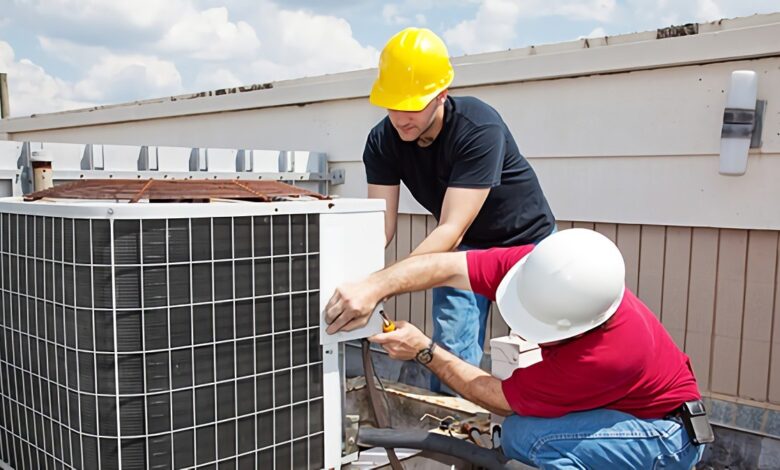Building a Career in Climate Control: What to Expect from HVAC School

In a world increasingly dependent on climate-controlled environments—homes, offices, hospitals, and data centers—the demand for skilled HVAC professionals has never been higher. HVAC, which stands for Heating, Ventilation, and Air Conditioning, is a critical industry that ensures comfort, air quality, and energy efficiency across all sectors of modern life. As a result, many people are turning to HVAC school as a smart and strategic entry point into a stable, well-paying, and hands-on career.
This guide explores everything you need to know about training in the HVAC field—from what programs entail and how long they take, to what careers they lead to and why now is the perfect time to consider enrolling.
Why Choose an HVAC Career?
Before diving into training specifics, it’s worth understanding why HVAC is a strong career path for many people:
- High Demand: HVAC technicians are essential across residential, commercial, and industrial sectors.
- Job Security: Because HVAC systems need ongoing maintenance and replacement, demand stays steady.
- Good Pay: Even entry-level technicians can earn solid wages, with potential for growth as skills increase.
- Hands-On Work: For those who prefer practical, active jobs over desk work, HVAC offers a perfect fit.
- Technological Growth: Modern HVAC systems now involve automation, smart thermostats, and eco-friendly technologies—keeping the work both dynamic and future-proof.
Choosing HVAC school is often the first—and most important—step toward tapping into these opportunities.
What Is HVAC School?
An HVAC school is a training institution that prepares students for entry-level work in the HVAC industry. Programs can be found at technical schools, community colleges, trade schools, and specialized institutes. These programs are designed to teach both the theoretical and practical aspects of HVAC systems and prepare students for certifications and real-world work.
What You’ll Learn
A typical HVAC program covers a wide range of topics, including:
- Principles of heating and cooling
- Thermodynamics and refrigeration cycles
- Airflow and duct design
- Electrical systems and controls
- EPA regulations and refrigerant handling
- Installation, maintenance, and repair techniques
- Safety procedures and building codes
- Energy efficiency and green technologies
Students will spend time both in the classroom and in labs or on simulated job sites, gaining experience with the tools and systems used in the field.
Types of HVAC Programs
The structure and duration of HVAC training vary depending on the institution and your long-term goals.
Certificate or Diploma Programs
- Duration: 6 months to 1 year
- Focus: These programs are designed for quick entry into the workforce. They offer intensive, hands-on training with a focus on core HVAC skills.
- Ideal For: Those looking to start working quickly or who may plan to continue their education later.
Associate Degree Programs
- Duration: 18 months to 2 years
- Focus: In addition to HVAC coursework, these programs include general education classes such as math, communication, and basic science.
- Ideal For: Students seeking broader education, better job prospects, or the ability to advance into management roles.
Continuing Education and Specialized Training
Some technicians return to HVAC school after years in the field to pursue specialized certifications in:
- Energy auditing
- Commercial HVAC systems
- Building automation systems
- Refrigeration technology
These programs help professionals stay up to date with evolving technologies and regulations.
HVAC Certifications
Completing school is only part of the process. To work legally and safely in the HVAC field, certifications are often required.
EPA Section 608 Certification
This is mandatory for anyone handling refrigerants. It has four types:
- Type I – Small appliances
- Type II – High-pressure systems
- Type III – Low-pressure systems
- Universal – Covers all three
Most HVAC school programs prepare students to take the EPA exam before graduation.
NATE Certification
The North American Technician Excellence (NATE) exam is an industry-recognized certification that demonstrates advanced knowledge and competence. It is often pursued after gaining work experience.
HVAC Excellence and Other Certifications
There are many other certifying organizations offering credentials in areas like electrical systems, green technologies, and system diagnostics. These can boost credibility and pay potential.
What Tools and Skills Will You Gain?
HVAC professionals work with a wide variety of tools and technologies. In school, students will typically train with:
- Manifold gauge sets
- Multimeters and electrical testers
- Leak detectors
- Vacuum pumps and refrigerant recovery machines
- Duct sizing tools and software
- Wiring schematics and blueprints
But just as important as technical tools are the soft skills that ensure success:
- Problem Solving: Diagnosing and fixing HVAC issues requires critical thinking.
- Communication: Explaining issues and options to clients or supervisors is key.
- Time Management: Jobs often require working under deadlines.
- Attention to Detail: Precision is essential when dealing with electrical components and refrigerants.
Career Paths After HVAC School
Graduates can follow multiple career directions, depending on their interests and certifications. Common roles include:
- HVAC Installer: Specializes in setting up new systems in residential or commercial properties.
- HVAC Service Technician: Performs maintenance and repairs on existing units.
- Refrigeration Technician: Focuses on systems used in grocery stores, restaurants, and cold storage.
- Controls Technician: Works with automated systems that regulate HVAC performance.
- Energy Auditor: Assesses buildings for energy efficiency and suggests HVAC improvements.
With experience, professionals may move into supervisory, teaching, or even business ownership roles.
Job Outlook and Salary Expectations
The HVAC field is expected to grow steadily in the coming years, driven by increased construction, technological updates, and environmental regulations. According to recent labor statistics:
- Job Growth: Projected growth is 5–10% over the next decade.
- Entry-Level Pay: Around $18–$24 per hour, depending on location and employer.
- Experienced Technicians: Can earn $60,000 or more annually.
- Specialists and Supervisors: May earn $70,000+ with certifications and field experience.
Unlike many other professions, there are minimal barriers to entry, and upward mobility is often based on skills and certifications rather than degrees.
Tips for Choosing the Right HVAC School
If you’re serious about a career in HVAC, choosing the right training program is crucial. Here are a few tips:
- Accreditation: Make sure the school is accredited by a recognized agency.
- Hands-On Training: Programs should offer real-world lab experience, not just classroom lectures.
- Certification Prep: Choose a school that prepares you for the EPA exam and offers help with other certifications.
- Job Placement Support: Many top schools offer career services, job boards, or partnerships with local employers.
- Experienced Instructors: Look for schools with faculty who have real-world HVAC experience.
Talk to recent graduates and read reviews before enrolling.
Final Thoughts
Enrolling in an HVAC school is more than just a step toward a new job—it’s an investment in a lifelong career with strong earning potential, consistent demand, and opportunities for advancement. Whether you’re fresh out of high school or looking for a career change, HVAC offers a practical, rewarding path forward.
The work is hands-on, essential, and constantly evolving with new technologies. With proper training, dedication, and a few certifications under your belt, you can join an industry that literally keeps the world running—comfortably.




